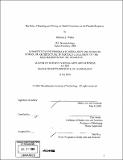| dc.contributor.advisor | Dan Ariely. | en_US |
| dc.contributor.author | Waber, Rebecca L | en_US |
| dc.contributor.other | Massachusetts Institute of Technology. Dept. of Architecture. Program in Media Arts and Sciences. | en_US |
| dc.date.accessioned | 2009-03-16T19:45:45Z | |
| dc.date.available | 2009-03-16T19:45:45Z | |
| dc.date.copyright | 2008 | en_US |
| dc.date.issued | 2008 | en_US |
| dc.identifier.uri | http://hdl.handle.net/1721.1/44805 | |
| dc.description | Thesis (S.M.)--Massachusetts Institute of Technology, School of Architecture and Planning, Program in Media Arts and Sciences, 2008. | en_US |
| dc.description | Includes bibliographical references (p. 59-64). | en_US |
| dc.description.abstract | Marketing factors such as pricing and branding are known to affect people's judgments and expectations regarding a product. When the product in question is a medical treatment, this effect may modify the placebo response. As the placebo response modifies the overall effect of the treatment in an additive manner, this implies that marketing factors may have a direct effect on medical outcomes, particularly in disorders that have large placebo effects. This thesis explores this idea. First a laboratory study is presented that used electric shocks and a placebo pill to demonstrate that a price discount may reduce the efficacy of a placebo analgesic. A second laboratory study, using the cold pressor test and a medication with low non-placebo efficacy, failed to demonstrate superiority of a brand-name over generic medication in terms of cold tolerance or pain ratings, but the brand-name did lead to quicker habituation to the cold pain. In addition, quantitative and qualitative research exploring attitudes held towards generic medications shows conflicted beliefs and a lack of complete trust in generic medications in both general and geriatric populations. "Non-commercial" forms of marketing, including the labeling of, and description of, a disorder, are also touched upon. The implications of this research for marketing are discussed, as well as necessary steps for the research development of this field. | en_US |
| dc.description.statementofresponsibility | by Rebecca L. Waber. | en_US |
| dc.format.extent | 80 p. | en_US |
| dc.language.iso | eng | en_US |
| dc.publisher | Massachusetts Institute of Technology | en_US |
| dc.rights | M.I.T. theses are protected by
copyright. They may be viewed from this source for any purpose, but
reproduction or distribution in any format is prohibited without written
permission. See provided URL for inquiries about permission. | en_US |
| dc.rights.uri | http://dspace.mit.edu/handle/1721.1/7582 | en_US |
| dc.subject | Architecture. Program in Media Arts and Sciences. | en_US |
| dc.title | The role of branding and pricing on health outcomes via the placebo response | en_US |
| dc.type | Thesis | en_US |
| dc.description.degree | S.M. | en_US |
| dc.contributor.department | Program in Media Arts and Sciences (Massachusetts Institute of Technology) | |
| dc.identifier.oclc | 300459504 | en_US |
